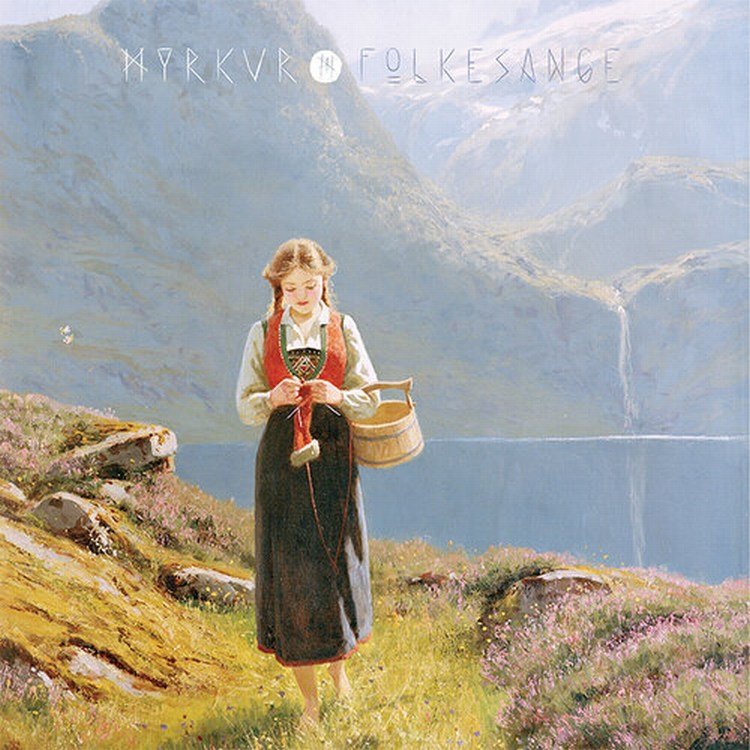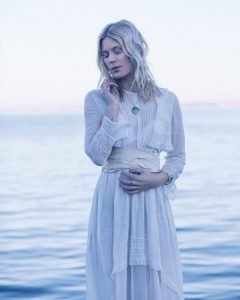
Myrkur on CeltCast? Really? If someone had told me that I would be writing a review of a Myrkur album, or that a Myrkur song would become a Monthly Marker, I would have laughed you straight in the face. Loudly actually! Up till now, the black metal Myrkur played was as far away from the CeltCast format as artistically possible. It was one of our photographers, Andre Willemse, that tipped us off that Folkesange, Myrkur’s newest record, was totally different. So the music team gave it a go… ….and totally fell in love with this exceptional Scandinavian folk album. Because that is what Folkesange is. Gone are all the blast beats, the battering guitar riffs, and the extreme black metal screams. Instead, we have a peaceful acoustic Scandinavian folk album. I can imagine the surprise on some metalheads faces when they heard this record for the first time, but from the CeltCast point of view we are quite happy that, the artist behind Myrkur, showed yet another side of her diverse musical personality.Researching Amalie’s musical history gave me one of the most interesting stories I’ve seen in a long time. Amalie was born in Denmark in 1985 and she released her first record ‘Amalie Bruun‘ which she wrote together with her father in 2006. In 2008 she recorded the theme song for the American reality show Paradise Hotel. The single, If You Give It Up, is actually a quite catchy pop song with a lovely Indian theme hidden inside. Following this first success she went to New York later in 2008. At that same time she recorded the EP Housecat, a very nice mix between alternative pop and singer-songwriter material. As if Björk – Human Behavior– met Emilia – Big Big World – on a Suzanne Vega party. I’m definitely going to try to get my hands on this interesting EP. Housecat won Amalie the New York Songwriters Circle International Award. In 2010, still under the name Amalie Bruun she released the EP Branches, less Björk, more Emilia, still catchy as hell, her future in the American charts seemed certain.
 But Amalie (picture with kind permission of Daria Endresen) decided differently, starting an interesting journey through music land, which tells me that she has a really broad taste in music and the ‘balls’ to go her own way.
But Amalie (picture with kind permission of Daria Endresen) decided differently, starting an interesting journey through music land, which tells me that she has a really broad taste in music and the ‘balls’ to go her own way. After working together with producer Mark Saunders and Rapper R.A. the Rugged Man, she ends up the band Ex Cops, with whom she recorded two albums, True Hallucinations (2013) and Daggers (2014). Their sound combined the sound of the Cardigans with electro-pop tracks and ,again, splashes of Bjórk. The Ex Cops broke up in 2015, and by then Amalie was already working on a secret project for Relapse Records: a black metal (!) project under the name of Myrkur, miles away from the singer-songwriter/alternative pop/rock music she was making up to that point.
Now I have to admit that black metal is one of the few genres of music that just doesn’t do anything for me, so I will not comment on any of the 2 EP’s or 3 records she has released under the Myrkur name, other than that it sounds rather melodic for a black metal band, and reading the internet comments she seems to have divided the black metal community slightly. With some calling her the fresh breeze of air the scene needed, and others expressing their dislike in the nice ‘polite’, ‘constructive’ manner that seems so ‘normal’ on the internet nowadays (NOT!) But now we have Folkesange, an acoustic Scandinavian folk album that again is a 180-degree twist in style that will, I am sure of that, raise even more discussion within the black metal world.
Will we do that too? Well no! First of all I fully understand why she did. Why do artists always have to bind themselves to one style? There is so much music to be explored. Why should fans decide what music an artist should make? And secondly, Folkesange is actually a really good album that we all love at CeltCast HQ. Alex even insisted I should write this review. And no wonder. What binds all of Amalie’s music together is her ability to write and record really catchy music, and Folkesange is no exception.
First to open the new album is the single Ella, a song written by Amalie herself, and straight away she lays her first artistic trump card on the table. Her beautiful voice with just a beat under it. A voice that is strong and captivating. This is followed by her second trump card, an orchestra of ancient Scandinavian folk that sweeps you away to times gone by. A really impressive start to the song ánd to the whole cd. During the song the arrangements become more modern, drifting towards the choral sound of Adiemus, tying together the modern with the old.
Fager Som En Ros is just as catchy, upbeat, and with a prominent place for the ancient Swedish instruments: the nyckelharpa, and the stråkharpa. giving the song a nice deep sound with Myrkur’s voice floating above it. Kaunan meets Kati Rán would probably be the best way to describe this song. Halfway through the song Myrkur throws in her final trump card: a powerful yoik cutting through the deep harpa sound. Mesmerizing. That yoik will return a couple of times more on Folkesange and was actually the trigger to buy the album myself.
Leaves Of Yggdrasil is a touching ballad, mixing the modern new-age sound of Adiemus and Clannad, with the ancient feel of Scandinavian folk and the angelic sound of the Sami yoik. Christopher Juul, ( Euzen, Heilung) as always, did a wonderful job recording it all. Together with Amalie, he created an album that sounds cold and white, which takes you deep into the fjords and woods of the Scandinavian peninsula. A sound that trembles ancient history and yet is as fresh as the first snow in early winter.
This feeling is even more present when listening to Tor I Holheim. I still remember the first time I heard someone singing a yoik. It was one of a few some small documentaries highlighting ancient traditions on Discovery Channel , and featured a Sami lady, with her colourful traditional clothing, who was filmed in a stunning white and green world that make up the beautiful pine forests of the deep Arctic north. She was explaining about her life, about how she traveled with the reindeer, the animals that still provide the Sami livelihood. And then she sang. An angelic high chant. A chant without words. A chant only meant to evoke or reflect an animal, a place, or a person. It fitted so perfectly, it gave me shivers down my spine. I’d never again came across a vocalist that had the same impact on me as that young Sami singer in that documentary. Until now that is! Listening to those first notes of Tor I Holheim, bringing back that beautiful memory, was enough to hit the buy button right there and then. Stunning, just stunning!
I could go on and on about Folkesange, but why would I. Every song is a beautiful mix of old Scandinavian folk in all its beauty combined with a modern new age choral sound that makes the deep sound of the old Scandi instruments sound even richer. The deep rich sound of Svea or Ramund (seen above), the medieval-sounding ballads Harpens Kraft and Gammelkäring, (a duet between the Strakharpa and Myrkur’s beautiful voice), the Joan Baez tribute House Carpenter, or the angelic piano ballad Vinter they are all beautiful songs celebrating Amalie’s childhood. Folkesange is Myrkur’s tribute to the music of her youth. It is, as stated on her website: – “a journey into the very heart of the Scandinavian culture that marked Amalie’s childhood.” The album is recorded in a contemporary way, but with so much respect for the age and history of this music. In short: a CD that swept us all away, and we hope it will do the same with you!
– Cliff
Editor: Sara Weeda Picture: Daria Endresen